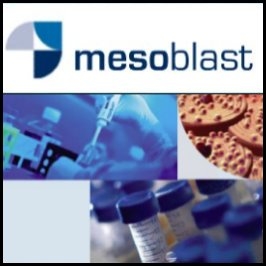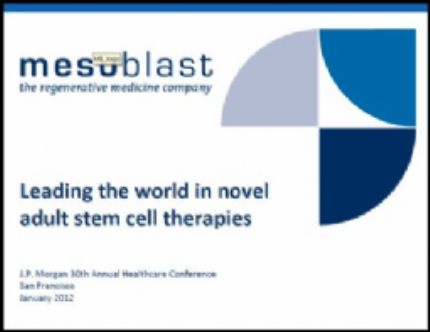
Mesoblast Limited (ASX:MSB) Announce Positive Results Of Novel Heart Attack Treatment Presented At Premier USA Cardiology Conference
Melbourne, Nov 16, 2010 AEST (ABN Newswire) - Regenerative medicine company Mesoblast Limited ( ASX:MSB) (
ASX:MSB) ( PINK:MBLTY) announced that positive preclinical trial results were today presented at the American Heart Association's annual conference in Chicago showing that the company's proprietary allogeneic (or "off-the-shelf") stem cells can be injected simply, safely, and effectively into the coronary arteries after a heart attack to prevent heart failure.
PINK:MBLTY) announced that positive preclinical trial results were today presented at the American Heart Association's annual conference in Chicago showing that the company's proprietary allogeneic (or "off-the-shelf") stem cells can be injected simply, safely, and effectively into the coronary arteries after a heart attack to prevent heart failure.
On the basis of these results, the company will proceed with multi-center Phase 2 clinical trials of its product Revascor (TM) delivered by a simple intracoronary infusion in heart attack patients immediately after they undergo a standard angioplasty and stent procedure to open a blocked coronary artery.
The study was performed in the Department of Interventional Cardiology at the Thoraxcenter of the Erasmus University Medical Center in Rotterdam, The Netherlands, one of the world's foremost interventional cardiology centers.
The results showed that a simple intracoronary infusion of the patented Mesenchymal Precursor Cells (MPCs) increased blood vessel numbers, prevented scar formation, and significantly improved heart muscle function after a heart attack preventing heart failure.
"These are the most compelling data that I have ever seen regarding a cell therapy approach in cardiovascular disease in the public domain or in non-disclosed data reports," said the study's Principal Investigator Associate Professor Eric Duckers, Head of Molecular Cardiology at the Thoraxcenter.
In the study, 30 sheep who underwent a large anterior myocardial infarct received an infusion into the coronary arteries of either saline (10 subjects) or allogeneic MPCs, at dosages of 12.5, 25, or 37.5 million cells (7, 7, 6 subjects/group). After two months, myocardial function, as measured by ejection fraction (EF), was significantly higher in every MPC dose group than in controls, with no significant differences noted between any of the dosages. Overall, EF in MPC-treated subjects was a mean of 12 points higher than in saline-treated controls (54.4+/-1.1% vs 42.5+/-3.6%, p<0.001). Similarly, every tested dose significantly reduced left ventricular dilation, with mean end systolic volumes in MPC-treated subjects 66+/-1.0 mL compared with 98.6+/-5.1 mL in saline-treated controls (P<0.001). Moreover, in comparison to controls, every MPC dose significantly reduced scar formation and fibrosis in heart muscle (50% mean reduction, P<0.005), and significantly increased blood vessel formation (69% mean increase in capillary density and 122% mean increase in arterioles, both P<0.001).
Heart attack is the single biggest killer of Americans with approximately 7.3 million American adults having had at least one heart attack and over 1.1 million patients having a first heart attack each year. About 80% now survive the initial heart attack. Most of these patients undergo an early angioplasty of the blocked artery accompanied by implantation of a metal stent to keep the artery open long-term. However, despite this success with early survival, a significant number of the surviving patients subsequently become disabled with heart failure.
Mesoblast's product will be developed as a simple off-the-shelf therapy for use in conjunction with angioplasty and stent procedures to prevent the complication of heart failure in those surviving a major heart attack.
Contact
Julie Meldrum
Corporate Communications Director
Mesoblast Limited
Tel: +61-3-9639-6036
Mob: +61-419-228-128
Email: julie.meldrum@mesoblast.com
http://www.mesoblast.com
| ||
|





